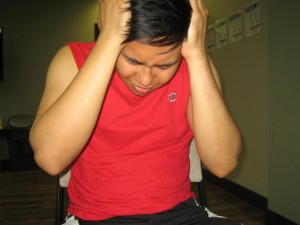A tension headache is considered the most common type of headache. Take note that this type of headache can lead to mild or moderate pain in the neck, head and behind the eyes. In most cases, the individual feels a tight band around the forehead. Individuals who suffer from this type of headache have episodic headaches which typically occur 1-2 times in a month. Nevertheless, tension headaches can also be chronic. If it is chronic, it includes episodes that can last for more than 15 days every month. Additionally, women are likely to suffer from this type of headache than men.
What are the causes of tension headaches?
Tension headaches are typically caused by muscle contractions in the head and neck. Certain activities, foods and stressors can cause these contractions. In some individuals, a tension headache develops after using a computer for extended periods. Additionally, exposure to cold temperature can trigger the headache. Other factors that can trigger the headache include:
- Consumption of alcohol
- Eye strain
- Smoking
- Fatigue
- Sinus infection
- Cold or flu
- Poor posture
- Caffeine
- Emotional stress
Symptoms of tension headaches
- Dull head pain
- Pressure around the forehead
- Tenderness on the scalp and around the forehead
Take note that the pain is typically mild or moderate but it can also be intense. If this is the case, some might confuse it with a migraine which is a type of headache the causes throbbing pain on one or both sides of the head. On the other hand, a tension headache does not cause nausea and vomiting. In rare cases, it can cause sensitivity to noise and light.
Treatment for tension headaches

pressure around the forehead.
Initially, you can provide over-the-counter medications for pain such as aspirin or ibuprofen. Other measures to ease a tension headache include the following:
- Apply an ice pack or heat pad over the head for 5-10 minutes several times in day for relied. If you want to learn the other uses of ice packs and heating pads, click here.
- Encourage the individual to improve his/her posture
- A hot shower or bath to relax the tense muscles
- For jobs that require long hours of using a computer, there should be frequent breaks to prevent eye strain
Take note that these measures will not prevent a tension headache from recurring in the future.
Preventing future tension headaches
Since this type of headache is often due to specific triggers, determining the factors that causes the headache is one way to prevent future episodes. Encourage the individual to keep a diary in order to determine the cause of the headache. The individual must record daily meals, activities, beverages and scenarios that trigger stress. After several weeks or months, what triggers the headache can be determined.
In cases where the headache disrupts daily life, the doctor might perform tests to rule out other problems. The tests that will be requested include a CT scan and MRI.
